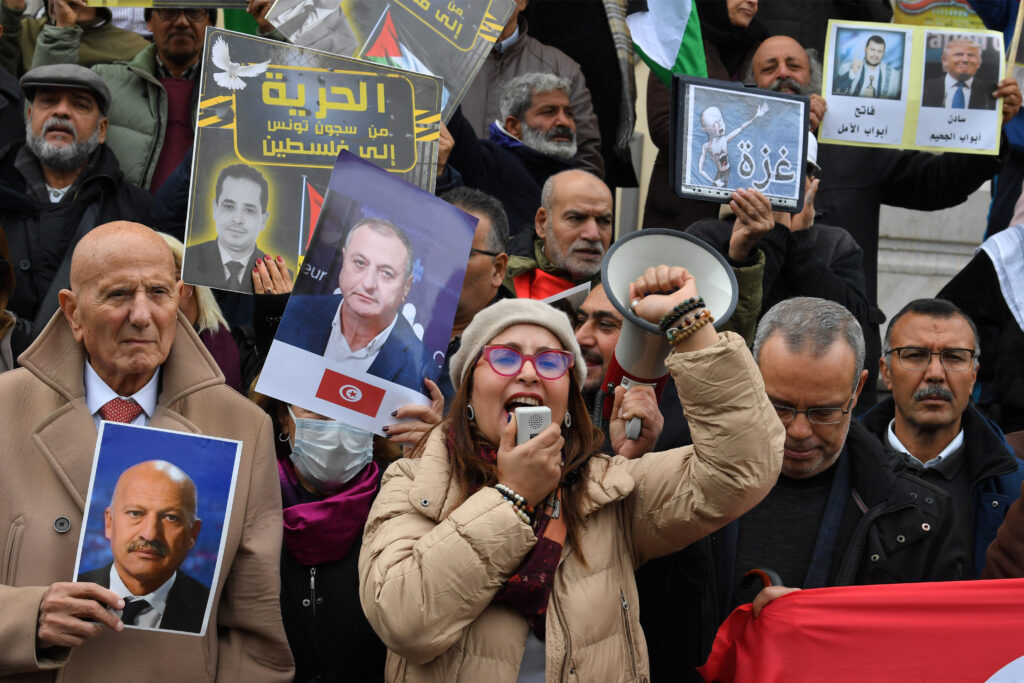Tunisians protested in the capital on Tuesday, calling for the release of jailed political figures as they marked the 14th anniversary of the uprising that sparked the Arab Spring revolts across the region.The dozens-strong march in Tunis, organised by a political coalition that includes staunch opponents of current President Kais Saied, commemorated the day in 2011 when dictator Zine El Abidine Ben Ali was ousted.Protesters voiced their anger at Saied’s administration, accusing the judiciary of acting on government “orders” and demanding an end to a crackdown on the president’s political opponents.A second, smaller wave of protesters took to the streets in downtown Tunis later in the afternoon.They carried signs reading “Revolution is an idea and ideas never die”, “Down with Kais Saied”, and “Freedom for political prisoners”.Though fewer than in similar gatherings in previous years, the demonstrators on Tuesday were faced with a heavy police presence, according to an AFP journalist.Many carried pictures of detained opposition figures, including former prime minister Ali Larayedh of the Islamist-inspired Ennahdha party, part of the National Salvation Front (FSN) that called the rally.Larayedh, who has denied wrongdoing, is held on charges linked to sending jihadists to Syria.Other prominent detainees include Rached Ghannouchi, the 83-year-old leader of Ennahdha, and Jawhar Ben Mbarek, co-founder of the FSN who faces charges of plotting against state security.Saied, re-elected in October in a vote marked by low turnout, made a sweeping power grab in 2021 which sparked accusation from critics and rights groups of an “authoritarian drift”.He also moved the official commemoration of the 2011 revolution to December 17 — the day in 2010 when street vendor Mohamed Bouazizi self-immolated, sparking the uprising.Many Tunisian activists and protesters still commemorate the revolution on January 14, the day Ben Ali fled Tunisia.Chaima Issa, an opposition figure and FSN member once imprisoned under Saied, said she would allow that day to be forgotten.”January 14 is not an easy date to erase,” she said.Human Rights Watch has said more than 170 people are detained in Tunisia on charges with political motives.Many of Saied’s critics are being prosecuted under a law introduced by presidential decree to punish “spreading false news” with up to 10 years in prison.
Tunisians protested in the capital on Tuesday, calling for the release of jailed political figures as they marked the 14th anniversary of the uprising that sparked the Arab Spring revolts across the region.The dozens-strong march in Tunis, organised by a political coalition that includes staunch opponents of current President Kais Saied, commemorated the day in 2011 when dictator Zine El Abidine Ben Ali was ousted.Protesters voiced their anger at Saied’s administration, accusing the judiciary of acting on government “orders” and demanding an end to a crackdown on the president’s political opponents.A second, smaller wave of protesters took to the streets in downtown Tunis later in the afternoon.They carried signs reading “Revolution is an idea and ideas never die”, “Down with Kais Saied”, and “Freedom for political prisoners”.Though fewer than in similar gatherings in previous years, the demonstrators on Tuesday were faced with a heavy police presence, according to an AFP journalist.Many carried pictures of detained opposition figures, including former prime minister Ali Larayedh of the Islamist-inspired Ennahdha party, part of the National Salvation Front (FSN) that called the rally.Larayedh, who has denied wrongdoing, is held on charges linked to sending jihadists to Syria.Other prominent detainees include Rached Ghannouchi, the 83-year-old leader of Ennahdha, and Jawhar Ben Mbarek, co-founder of the FSN who faces charges of plotting against state security.Saied, re-elected in October in a vote marked by low turnout, made a sweeping power grab in 2021 which sparked accusation from critics and rights groups of an “authoritarian drift”.He also moved the official commemoration of the 2011 revolution to December 17 — the day in 2010 when street vendor Mohamed Bouazizi self-immolated, sparking the uprising.Many Tunisian activists and protesters still commemorate the revolution on January 14, the day Ben Ali fled Tunisia.Chaima Issa, an opposition figure and FSN member once imprisoned under Saied, said she would allow that day to be forgotten.”January 14 is not an easy date to erase,” she said.Human Rights Watch has said more than 170 people are detained in Tunisia on charges with political motives.Many of Saied’s critics are being prosecuted under a law introduced by presidential decree to punish “spreading false news” with up to 10 years in prison.
